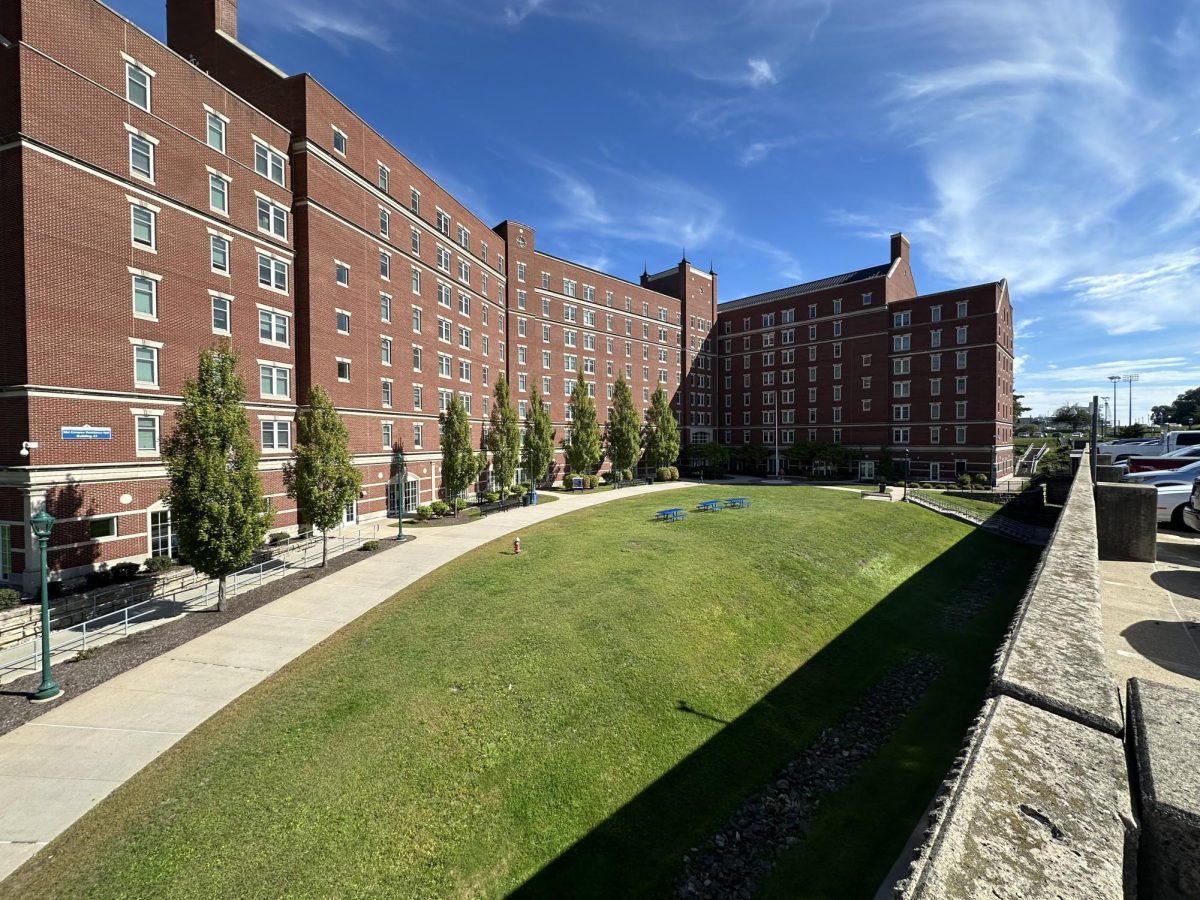By Matt Clyburn

Students, faculty and members of the public descended on the Legislative Office Building in Hartford Monday to organize against Governor Dannel Malloy’s proposal that would cut funding to the state’s higher education system by more than 10 percent.
The American Association of University Professors transported students and professors to the Joint Appropriations Committee public hearing where people were invited to speak or listen to the proceedings. Free t-shirts and dinner were also provided for students who registered in advance.
Amanda West, CCSU student and a student center manager, was there to learn about the options facing the committee.
“I really don’t want to see money taken away from my school, but if there’s no other way then I want to know where we’re going to get the money,” West said. “I’d rather find out why I’m being hurt than just being told ‘We’re taking this away from you.'”
“They’ve raised tuition nearly every year since I’ve come to CCSU,” West said. “In that four years, a small increase has become a large amount of money. It’s the quality of the education that I don’t want to suffer – if I have to pay more for a better education, that’s understandable. But if I have to pay more for an education that’s worse than the one I’ve previously received, or that goes down in standards, I think that’s unacceptable.”
Amanda Beaulieu, a CCSU student and info desk employee, is getting into the education field upon graduation.
“Why not get involved now? It’s my education, it’s my money, so I want to know what’s happening,” said Beaulieu.
“I feel like the CSU system is the system that needs [funding] the most, so they need to work something out for us,” Beaulieu said. “I think that people care more if they have to pay for their education like us; tuition increases add up. Our classes are going to be affected if the universities are unable to hire new professors or replace professors that have retired, classes will get bigger.”
CCSU student Kaylah Smith said “I think it’s our responsibility as students to come out and support the cause. It may not affect us right away, but it will affect other people who make the same decision we did to come to college. I think it’s important for us to take a stand. It’s not just about us, it’s about the future of education in Connecticut.”
Smith’s classmate, Theresa Degan, agreed.
“With less professors comes less students, eventually, so I think it’s important for students to oppose the budget cuts,” said Degan. “Our generation has been known as the ‘lazy generation,’ so I think it is important for professors to impart on us the necessity to get out and actually make our voices heard, otherwise we’re going to lose so much.”
“I chose Central above any other state university because of its individuality,” said CCSU student Giselle Ziegler. “I couldn’t picture myself at any other university because of the special things Central has to offer me through the music education department, through the education department itself. I think that if things were to become too centralized…every single university would lose the things that make it special to some degree.”
Students were also on hand from other Connecticut State Universities.
Marissa Fazzino of SCSU said, “I thought coming here was a good idea because the issues affect us directly. Southern has a possible 25 percent deduction in funding, so we thought that’s a good incentive to show up and show that we care.”
“Quite frankly, I’m against the merging of the CSU system in with the community colleges and the Charter Oak system,” said Zach Kunicki of WCSU. “While we do need to make budget cuts, I don’t think this is the proper way to do it and I feel that we could be more creative with our solutions.”
“It’s not that I don’t like the CCSU students or the community college students, or the charter oak students. I feel that each university has its own perks,” Kunicki said. “For example, Western has a really good jazz program and a great history program. Each one of these universities is known for something that makes it unique and makes it special and I feel that if we merge them all together, you kind of lose that.”
Melissa Hood, also a student at Western, said that she attended the hearing to “get a feel for what this really is all about and hear it directly from the people and the legislators.”
“On paper, [the proposals] sound good, but then where are the negatives?” Hood said. “What are the negatives?”
Elsa Nunez, president of ECSU, was on hand to watch the proceedings and discuss Malloy’s proposal.
“I want to support the governor in looking at all the ways we can save money and be more efficient because I think the governor has a strong case,” Nunez told The Recorder. “The state is in debt $4 billion dollars and how do we help him make that budget balanced?”
“The basic question is, if you do the restructuring, what are the savings?” Nunez asked. “Where will those savings go? Will they go back to the colleges, will they go to the general fund? We need to know.”
Nunez took the occasion to point out that there are differences in identity among the CSU schools.
“Even though you might want to save money, you really do sometimes compromise the mission by having everybody mixed in together,” Nunez said. “I’m not against his proposal but I want to know what are the real savings and what is it going to mean to the students. When students choose a school, it’s because they’re attracted to the core values of an institution, the mission, the kind of major they can get there. So I would be worried that in a merger like this we might lose that focus.”
“I’m very optimistic that the right people around the table can do what’s best for Connecticut,” Nunez said.
CCSU faculty members and members of the CSU Chapter of the AAUP spoke before the committee hearing that filled the main conference room and pushed observers into three overflow rooms.
Jason Jones, president of the CCSU chapter, said “It is important to understand…that the proposed budget cut at its magnitude will make it impossible to meet the governor’s stated goal of putting more dollars into instruction and will do long-term harm to our graduation rates and other measures of student success.”
“The proposed budget and reorganization thus cuts higher education in four different ways,” Jones said. “First, through a direct cut to the block grant; second, through applied cuts caused by budgetary uncertainties around the reorganization; third, through concessions being exacted from state workers; and fourth through a tax hike on most of the faculty and staff in such a system.”
English professor Gil Giglotti spoke about CCSU students and the affect the budget cuts could have on their livelihood.
“If I had to summarize the CCSU student population in one word I would call them ‘tenacious,’ for their ability to adapt to circumstances often beyond their control,” said Giglotti.
“These tenacious students do not quit,” Giglotti said. “They, not infrequently, may switch from full-time status to part-time status, take classes at a community college closer to home or leave the residence halls and return home to save money, or some other fairly extreme solution, any of which makes it difficult to engage in the university the way we know can change their lives for the better and help them develop into engaged and productive citizens of Connecticut.
“What I fear is that when our tenacious students are hit not only with higher gas taxes and sales taxes and income taxes,” Giglotti said, “but also with cuts at CCSU that will result in larger classes, fewer course offerings, fewer student services and a longer road to graduation, their tenacity may turn to frustration, their frustration to resignation and their resignation to incompletion. The incompletion of their degree, the incompletion of their growth and their potential and the incompletion of their full participation in the future of Connecticut.”


